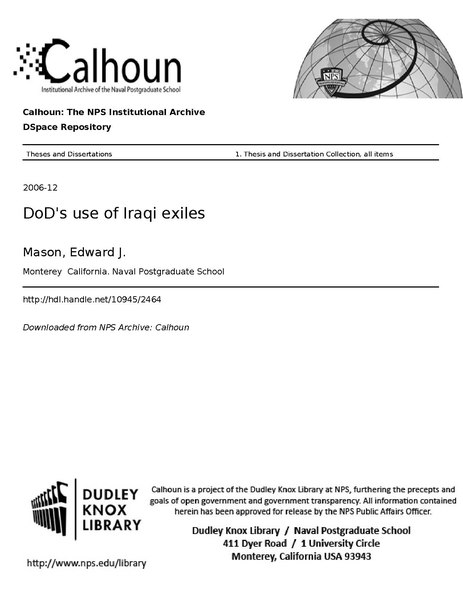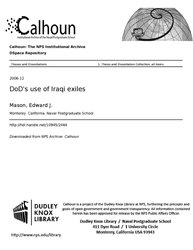File:DoD's use of Iraqi exiles (IA dodsuseofiraqiex109452464).pdf

Original file (1,275 × 1,650 pixels, file size: 340 KB, MIME type: application/pdf, 76 pages)
Captions
Captions
Summary edit
| DoD's use of Iraqi exiles
( |
||
|---|---|---|
| Author |
Mason, Edward J. |
|
| Title |
DoD's use of Iraqi exiles |
|
| Publisher |
Monterey California. Naval Postgraduate School |
|
| Description |
The U.S. government has utilized exiles for decades, the latest example being the use of Iraqi exiles starting after the Gulf War. For close to thirteen years America supported Iraqi opposition groups, overtly after the signing of the Iraq Liberation Act of 1998. DoD's role until months before the invasion of Iraq was minimal, but then increased dramatically. Iraqi opposition groups provided names of volunteers willing to work with the U.S. military. Most were turned away for a number of reasons, but those selected were trained in civil affairs operations and embedded with great success in small teams into U.S. civil affairs units. Another program, even more ad hoc, involved Ahmad Chalabi's fighting forces. Not receiving the welcome from Iraqis that intelligence experts told them to expect, U.S. military commanders were eager to put an \"Iraqi face\" on operations and build the core of the new Iraqi army. Chalabi's fighters, escorted by Army Special Forces A-Teams, provided a number of useful services to the war effort, but with minimal logistical support and hindered by Chalabi's political ambitions, they were quickly disbanded. Exiles have many of the skills necessary in conventional and asymmetric warfare: language skills, familial ties, and cultural proficiency. But this unique segment of our society needs to be better utilized by DoD. After analyzing each of the Iraqi exile programs in detail, suggestions on how to harness needed skills in the future are offered. Subjects: Counterinsurgency; International relations; Refugees; National security |
|
| Language | English | |
| Publication date | December 2006 | |
| Current location |
IA Collections: navalpostgraduateschoollibrary; fedlink |
|
| Accession number |
dodsuseofiraqiex109452464 |
|
| Source | ||
| Permission (Reusing this file) |
Approved for public release, distribution unlimited | |
Licensing edit
| Public domainPublic domainfalsefalse |
This work is in the public domain in the United States because it is a work prepared by an officer or employee of the United States Government as part of that person’s official duties under the terms of Title 17, Chapter 1, Section 105 of the US Code.
Note: This only applies to original works of the Federal Government and not to the work of any individual U.S. state, territory, commonwealth, county, municipality, or any other subdivision. This template also does not apply to postage stamp designs published by the United States Postal Service since 1978. (See § 313.6(C)(1) of Compendium of U.S. Copyright Office Practices). It also does not apply to certain US coins; see The US Mint Terms of Use.
|
 | |
| This file has been identified as being free of known restrictions under copyright law, including all related and neighboring rights. | ||
https://creativecommons.org/publicdomain/mark/1.0/PDMCreative Commons Public Domain Mark 1.0falsefalse
File history
Click on a date/time to view the file as it appeared at that time.
| Date/Time | Thumbnail | Dimensions | User | Comment | |
|---|---|---|---|---|---|
| current | 13:21, 17 July 2020 |  | 1,275 × 1,650, 76 pages (340 KB) | Fæ (talk | contribs) | FEDLINK - United States Federal Collection dodsuseofiraqiex109452464 (User talk:Fæ/IA books#Fork8) (batch 1993-2020 #14164) |
You cannot overwrite this file.
File usage on Commons
The following page uses this file:
Metadata
This file contains additional information such as Exif metadata which may have been added by the digital camera, scanner, or software program used to create or digitize it. If the file has been modified from its original state, some details such as the timestamp may not fully reflect those of the original file. The timestamp is only as accurate as the clock in the camera, and it may be completely wrong.
| Short title | DoD's use of Iraqi exiles |
|---|---|
| Author | Mason, Edward J. |
| Software used | Mason, Edward J. |
| Conversion program | Acrobat Distiller 6.0.1 (Windows) |
| Encrypted | no |
| Page size | 612 x 792 pts (letter) |
| Version of PDF format | 1.4 |

